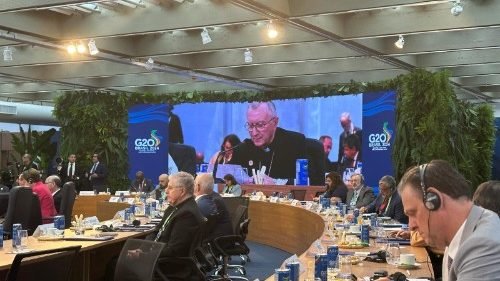In a message addressed to the President of Brazil hosting the G20 Summit for international economic cooperation, Pope Francis calls for immediate and united efforts to eradicate world hunger and poverty.
By Vatican News
Pope Francis has called attention to the scandal of world hunger, worsened by the armed conflicts in our world today and the huge amounts of money spent on weapons and armaments rather than helping to feed three billion people in our would without access to food or adequate nutrition.
The Pope’s words came in a message read by Cardinal Pietro Parolin, Vatican Secretary of State, addressed to Brazil’s President Luiz Inácio Lula da Silva. Brazil is hosting the two-day G20 Leaders’ Summit that opened on 18 November in Rio de Janeiro with the presence of the leaders of the 19 member countries, plus the African Union and the European Union.
Contributing to a better world
In congratulating President Lula da Silva for facilitating the meeting in its role as current chair of the Group of 20, the Pope expressed his greetings and hope to all those participating so that their discussions and the outcomes will truly contribute to making a better world and a prosperous future for the generations to come.
Ending scandal of world hunger
The Pope underscored the immediate and primary necessity of eliminating hunger in our world as many millions continue to suffer and die from hunger, while tons of food are thrown away, quoting from his Encyclical Letter Fratelli Tutti, how “this constitutes a genuine scandal” and stressing that “hunger is criminal; food is an inalienable right.”
Halting wars, building lasting peace
Acknowledging the problems caused by wars, conflicts, and the persistence of injustices, the Pope underscored the importance in finding new ways to achieve “a stable and lasting peace in all conflict-related areas, with the objective of restoring the dignity of those affected.” The death and destruction caused by these wars is also contributing to worsening famine and poverty, he pointed out, affecting places even far away from the conflicts through the disruption of supply chains and huge amounts of money spent for weapons and armaments as a result.
Addressing the tragedy of starvation
Of great concern today, the Pope writes, is how the world has still not found ways to deal with the tragedy of starvation, and this “silent acceptance” by society is “a scandalous injustice and a grave offence.” This is especially true when those through usury or greed cause the starvation of their brothers and sisters, which is “committing a homicide.” Therefore, he stresses, “no effort should be spared to lift people out of poverty and hunger.”
Poverty contributing to hunger crisis
Social and economic injustices exacerbate the reality of hunger, the Pope continues, and this poverty can perpetuate “a cycle of economic and social inequalities that are pervasive in our global society.”
“It is thus evident that immediate and decisive action must be taken to eradicate the scourge of hunger and poverty. Such action must be undertaken in a joint and collaborative manner, with the involvement of the entire international community.”
Effective measures require “a concrete commitment from governments, international organisations and society as a whole” the Pope writes, and these include access to basic goods, fair distribution of vital resources that respects “the God-given human dignity of every individual.”
Tackling food waste
Collective action is also needed to address the scandal of food waste, the Pope also points out, as even today there is enough food to feed everyone, but it is unequally distributed for various reasons. Efforts to address these challenges will require a “long-term vision and strategy…necessary to combat effectively malnutrition” the Pope writes.
To this end, he offered his support that the Global Alliance Against Hunger and Poverty can play a key role in addressing hunger and poverty, also implementing a long-standing proposal of the Holy See calling for “redirecting funds currently allocated to weapons and other military expenditures towards a global fund designed to address hunger and promote development in the most impoverished countries.”
Avoiding ‘ideological colonisation’
The Pope also underscores the need for projects that are not imposed from the outside, but “planned and implemented in response to the needs of the people and their communities.”
In conclusion, the Pope assured that the Holy See will continue in its efforts to promote human dignity and offer its own contribution through the sharing of experiences and engagement of Catholic institutions worldwide, “so that in our world no human being, as a person loved by God, be deprived of his or her daily bread.”
“May Almighty God abundantly bless your works and efforts for the genuine progress of the entire human family.”



